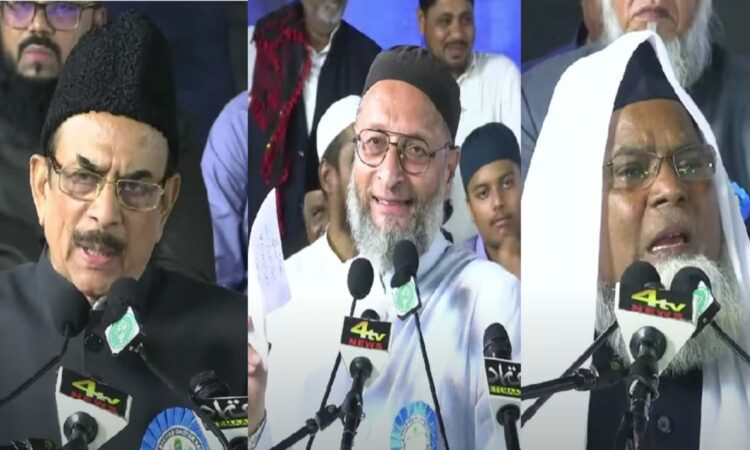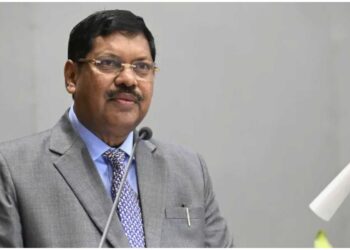HYDERABAD: A massive protest rally against the Waqf Amendment Act was held in Hyderabad on Sunday night, drawing tens of thousands of participants to the historic grounds of Darussalam. The All India Muslim Personal Law Board (AIMPLB) organised the demonstration, which was hosted by the All India Majlis-e-Ittehadul Muslimeen (AIMIM) and led by top religious and political leaders. Slogans of resistance echoed across the city, as protestors demanded an immediate repeal of what they called a “black law”.
Crowds packed the entire venue, spilling far beyond the boundaries of Darussalam. The vast field struggled to contain the turnout, with attendees forming a visible sea of people stretching in every direction. Flashlights from mobile phones lit up the night sky as a symbolic gesture of awakening, sending a visual message of unity and defiance to the Centre.
Massive turnout in Hyderabad sends strong message to Centre
In his address, AIMPLB President Maulana Khalid Saifullah Rahmani declared that the community would not accept cosmetic amendments or misleading narratives. He clarified that the Supreme Court had not struck down the Waqf Amendment Act, but had merely issued interim relief on two provisions. “Such claims of victory are deceptive. We must not fall for them,” he said.
He explained that earlier, Waqf properties had been exempt from the Limitation Act. Under the amended law, however, any person occupying Waqf land for more than 12 years could claim ownership. “This is extremely dangerous,” he warned, “because across the country, Waqf lands are under illegal occupation—with the support of some governments and powerful businessmen.”
Maulana Rahmani also highlighted that sites declared as protected monuments under the Archaeological Survey of India would no longer retain their Waqf status. “Imagine if the government designates Hyderabad’s 300-year-old Mecca Masjid as a heritage monument,” he said. “It would no longer be a mosque for worship, but merely a tourist site.”
He criticised the clause barring individuals from making waqf endowments unless they had actively practised Islam for five consecutive years. “This violates both religious and personal freedoms,” he stated. “It prevents wealthy Muslims from donating part of their assets as charity for the hereafter—something that is deeply rooted in our faith.”
Calling the amendments an existential threat, he added, “This is not about a technicality. This is about losing the religious, educational, and charitable institutions our ancestors built for generations to come.”
Maulana Rahmani emphasised that the Board represents all schools of Islamic thought—Sunni, Shia, Hanafi, Ahl-e-Hadith, Tablighi Jamaat, Jamaat-e-Islami, and spiritual custodians of dargahs—united on a single platform. He warned against attempts to discredit the Board through disinformation, especially on social media. “Our true strength is not in weapons. It is in our faith and our unity. If we lose these, we lose everything,” he said.
Religious and political leaders denounce ‘black law’
Barrister Asaduddin Owaisi, MP from Hyderabad and President of AIMIM, opened his speech with a powerful couplet:
جب ضمیر وظرف کا سودا ہو دوستو
قائم رہو حسین کے انکار کی طرح
“When conscience and integrity are for sale, Stand firm like Hussain (RA) in his refusal.”
He accused the Centre of attempting to erase Muslim identity through legislation. “The Waqf Amendment Act is not just unjust—it’s unconstitutional,” he said. “We will not surrender. We will resist through peaceful and democratic means.”
Owaisi recalled how he had torn a copy of the amendment bill in Parliament. “That was not just my protest. It was on behalf of every Indian—Hindu, Muslim, Sikh, Christian—who values the Constitution,” he declared.
He criticised the BJP’s legislative track record, citing a pattern of anti-Muslim laws: triple talaq, CAA, a stricter UAPA, anti-conversion laws in BJP-ruled states, and now the push for a Uniform Civil Code. “For 11 years, Narendra Modi has been attacking our religious identity,” he said. “Mosques have been targeted, hijabs banned, homes bulldozed.”
In a dramatic moment, he led the crowd in structured slogans. He called out “Nara-e-Takbeer” once, and those gathered outside Darussalam responded with a thunderous “Allahu Akbar”. On his second call, both the ground and surrounding streets erupted in unison, shaking the atmosphere with chants.
He then requested the crowd to turn on their mobile flashlights. “Let this light reach those whose minds are in darkness. Let this be the message from Hyderabad to Delhi,” he said.
Urging vigilance, Owaisi warned of infiltration: “Remember, the Sangh Parivar will plant their Mir Jafars and Mir Sadiqs among us. Stay united. Stay strong.”

Calls for unity, legal resistance, and educational empowerment
Former Deputy Chief Minister of Telangana and senior BRS leader Mohammed Mahmood Ali affirmed that his party strongly opposed the Waqf Amendment Act. He said BRS MPs, under the instructions of party chief K. Chandrashekar Rao, voted against the bill in the Rajya Sabha. “This law is not just legal—it’s political. It aims to dispossess us of our identity, our dignity, and our property,” he said.
He added that Waqf is the most sacred form of charity in Islam, meant to fund schools, orphanages, hospitals, and mosques. “The very purpose of waqf is public good. And now they want to snatch it away,” he said.
He pointed out that while Muslims have only 24 MPs in the Lok Sabha, 232 members voted against the bill, demonstrating the support of secular allies. “This is a national issue, not a community issue,” he said.
Mahmood Ali noted that under the BRS government, 204 minority residential schools were established across Telangana, and thousands of poor students benefitted from overseas scholarships. “If we had used waqf lands effectively, Muslims would have progressed in every field,” he said.
He also criticised the inclusion of non-Muslim members in Waqf Boards, questioning whether Muslims would be allowed in Hindu religious boards. “If not, then where is the secularism? Where is the equality?” he asked.
Calling for the Act’s immediate repeal, he demanded that Waqf Boards be strengthened with judicial powers, and that encroachments be legally reversed.
Maulana Hussaamuddin Thani Aqil Jafar Pasha of the Imarat-e-Millat-e-Islamia also addressed the gathering. He said that if the system of waqf is dismantled, even burial grounds could disappear. “Today, our mosques, madrasas, and cemeteries stand on lands our ancestors donated. If this law passes, even our dead will have no place,” he warned.
He urged participants to raise awareness in their localities and protect these sacred trusts. “These properties are Allah’s trust. Their protection is a religious duty,” he said. “Let us unite politically, socially, and spiritually to fight this injustice.”
The event concluded with speeches from other Islamic scholars and leaders, including Maulana Ghiyas Ahmad Rashadi and Tamil Nadu MP Mohammad Abdullah, who echoed the same demand: that the Waqf Amendment Act be fully withdrawn and that Muslim rights, heritage, and autonomy be respected.










